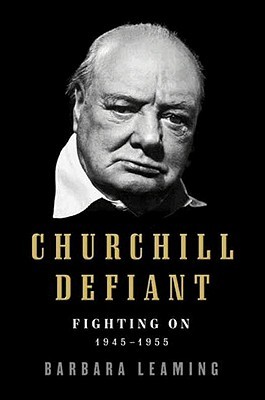
Churchill Defiant
Fighting On: 1945-1955
فرمت کتاب
ebook
تاریخ انتشار
2010
نویسنده
Victoria Moranنویسنده
Samantha Powerنویسنده
Victoria Moranنویسنده
Samantha Powerنویسنده
Barbara Leamingشابک
9780062015334
کتاب های مرتبط
- اطلاعات
- نقد و بررسی
- دیدگاه کاربران
نقد و بررسی

July 26, 2010
It was the grandest of evenings. On April 4, 1955, the young Queen Elizabeth II paid her prime minister, Winston Churchill, the compliment of coming to dine at 10 Downing Street. The occasion was Churchill's retirement from the pinnacle of power after his second reign as prime minister. Wearing knee breeches and the blue sash of the Order of the Garter, Churchill saw her out just before midnight. He bowed and took her hand. An era seemed to be ending, one generation giving way to another; at last it would be Anthony Eden's turn. Back inside, Churchill sat gloomily on the edge of his bed. "I don't believe Anthony can do it," he mused. The remark was, in a way, the last, private whimper from the man William Manchester indelibly called "The Last Lion." The scene, with its revealing and surprising glimpse of Churchill behind the curtain in his final political chapter, tells us much about the complexities and contradictions of Churchill at the end, and it closes Barbara Leaming's new narrative. Leaming, most recently the author of a fine biography of John F. Kennedy, has given us a concise history of Churchill after the trumpets. Readers who know him only as the hero of 1940 will be surprised to find an all-too-human politician in these pages, a man who lived for power and was driven by a noble dream: the making of peace in a nuclear age. Churchill's is one of the most chronicled lives in history (he himself once remarked that it was already "well-ploughed" in his own lifetime), but Leaming has done a good job of adding details to the familiar story: her account of Churchill's visit to Berlin, including to Hitler's bunker, is particularly strong. Here is her description of him on that day in July 1945, just before the British electorate turned him out: "The man who visited Hitler's bunker had recast himself in just five years as one of history's titans. Had Churchill died before 1940, he might have been remembered as a prodigiously gifted failure. On this day, he was at the apex of his glory. Yet thus far, he had appeared oddly detached and distracted. His bulbous, bloodshot, light blue eyes surveyed the devastation at the Chancellery..." He was old and tired—but he never gave up, as the nation would learn anew in the long decade between the 1945 general election and the dinner with the queen in 1955. From Eden to Harry Truman, the supporting characters are well drawn, and they give the book a sprightly feel. Unfortunately, Leaming's narrative is marred by the occasional cliché and awkward phrasing (bombshells drop, rooms seethe, cold water is doused). Taken all in all, however, the book is a well-told political drama about the greatest figure of an epic century. Not a bad achievement, that. Jon Meacham, who won the Pulitzer Prize for his American Lion in 2009, is at work on a biography of Thomas Jefferson. Reviewed by John Meacham.

July 15, 2010
Accomplished biographer Leaming (Jack Kennedy: The Education of a Statesman, 2006, etc.) tracks Winston Churchill's masterful postwar comeback.
Voted from power just as he was implementing the Allied peace terms at Potsdam and warning of Soviet expansion in Eastern Europe, Churchill was blindsided but determined to continue to lead his Conservative party. The author provides a lively chronicle of his incremental rehabilitation. Churchill's career might have been heretofore defined by "unsquashable resilience," but he was "absorbed by the idea that a comeback was impossible." His warning of pernicious goings-on behind "the iron curtain" was out of sync with the popular mood of triumphant celebration in August 1945. Yet despite being in his 70s and having suffered several strokes, he spent the next five years speechifying, preparing his memoirs, painting and traveling. He refused to retire, believing that he still had a mission to accomplish. Moreover, he maintained that his heir apparent, Anthony Eden, was not ready to inherit the mantle. As Truman and the West were catching on to the Soviet threat, Churchill redoubled his "usual blood-and-thunder anti-socialism" message. He used the occasion of the publication of The Gathering Storm (1947) to remind readers of his initial warnings to the Allies about allowing the Russians to take Berlin first, a decision defended vehemently by Eisenhower his memoir published the same year, Crusade in Europe. The Conservatives were voted back in by October 1951, and Churchill immediately pushed for a summit with Stalin but was put off by the American presidential election. Stalin's subsequent death, Eden's ill health, Churchill's own faltering strength and the necessity of negotiating the atomic debates and Indo-China machinations led to final debilitation, and he was squeezed out shortly after his 80th birthday. Using a variety of material, Leaming executes a smooth, succinct narrative.
Tight, polished and effectively focused on the lesser-known end of Churchill's career.
(COPYRIGHT (2010) KIRKUS REVIEWS/NIELSEN BUSINESS MEDIA, INC. ALL RIGHTS RESERVED.)

























دیدگاه کاربران